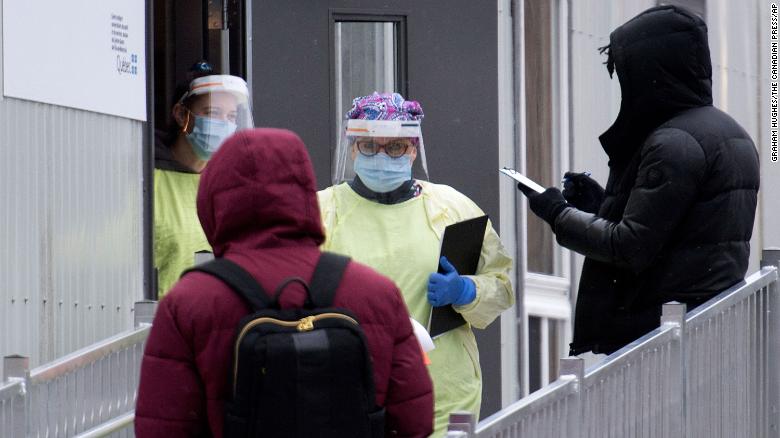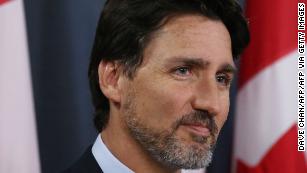
By Paula Newton, CNN
December 8, 2020
Canadian premier's impassioned plea: Stay home for the holidays 01:38
Ottawa (CNN)"At least we're not as bad as the States."
Those were the words uttered by so many Canadians during the first wave of coronavirus, perhaps without malice although with a good dose of smugness.
But that complacency may have helped fuel a deadly second wave in Canada that is now straining hospital capacity in nearly every region of the country as health officials impose more restrictions and lockdowns.
"What you're saying is we're better than the worst country in the world," says Amir Attaran, an American-raised Canadian professor of law and public health at the University of Ottawa during an interview with CNN.
For months, Attaran has been an unsparing critic, warning that by measuring itself against an American yardstick, Canada's Covid-19 response was bound to falter.
And falter it has
Canada's 'Atlantic bubble' has been a sanctuary. But it may be bursting soon 03:31
"Over the last few days, we've seen new records of Covid-19 cases in a number of provinces. Hospitalizations are rising, families are losing people and our most vulnerable are at risk. Just because we're getting closer to vaccines doesn't mean we can afford to become complacent," warned Canadian Prime Minister Justin Trudeau during a press conference Monday.
So, what went wrong?
"You need to drive community transmission to almost nothing or near nothing and then do the aggressive testing contact tracing and isolation which we never did," says Attaran.
During the first wave of Covid-19 Canadians were mostly compliant, cautious and serious about staying home, masking up and following orders issued by earnest public health officials. And the pandemic was rarely politicized.
But in early fall, Canadian public health officials warned that private, household gatherings were fueling a surge in cases and community transmission.
Then, Canadian Thanksgiving in early October seemed to seal the country's fate as infection rates surged for weeks afterwards.
Canada's numbers are heading in the wrong direction
Canada has logged record new cases and deaths from the coronavirus in the past month, according to Covid-19 tracking data from Johns Hopkins University.
The country has reported more than 425,000 cases of Covid-19 and nearly 12,800 deaths to date, according to Johns Hopkins.
New daily cases are now 10 times higher than they were in late summer with deaths averaging about 88 per day now, according to Canada's Public Health Agency.

Health care workers talk to people waiting to BE tested for Covid-19 at a clinic in Montreal on Sunday, December 6.
For a few days in summer, Canadian government data reported no deaths from Covid-19.
By nearly every measure of Covid-19 tracking, Canada is still faring better than the US but Canadian officials have warned that hospital capacity is reaching its breaking point and community transmission must be reduced.
According to government data, Canada now has about 2,400 people with the virus being treated in hospitals. That's a few hundred less than Los Angeles County reported Monday even though Canada has nearly 4 times the population.
More than 14.9 million coronavirus cases have been reported in the US so far and more than 284,000 people have died. The US also is dealing with a surge in cases that health experts expect worsen, anticipating new waves from December holiday gatherings on top of a potential surge from Thanksgiving week.
But again, public health experts warn American comparisons should offer little comfort to Canadians.
Lack of adequate testing
For weeks now Canada's public health agency has reported that, on average, about 75,000 Canadians are being tested daily. That means Canada is testing at about half the rate, per capita, than the US.
Public health experts say Canada must be more aggressive with testing in order to bring down community transmission and detect asymptomatic spread.
According to a report released Monday by one of Canada's largest long-term care operators, that lack of testing has tragically allowed the virus to stalk and kill residents of nursing and retirement homes in Canada.
Canadian government data show that as of August 2020, nearly 80% of all Canadian coronavirus deaths were among residents of long-term care facilities. During a press conference in late October, Canada's Chief Public Health Officer Theresa Tam confirmed that figure did not change much in the fall although the national public health agency is awaiting data.
And yet lack of adequate testing in these facilities continues.
In a report released Monday by a government-owned long-term care operator, an expert advisory panel noted not just the testing failures of the first wave, but that inadequate testing continues.
"...although it was widely understood that long term care residents faced an extremely high risk of serious complications and death from Covid-19, and so had much to gain from testing, they and the staff who look after them, were not prioritized for testing within the system," according to the report titled "A Perfect Storm."
Vaccines are coming but timeline is an issue
Trudeau has said for weeks that Canada has secured "one of the most diverse" vaccine portfolios in the world and a CNN analysis of government purchase agreements shows Canada could easily have 4 to 5 times the vaccines needed to vaccinate its entire population of about 38 million people.
It's the timeline that's the problem.
"Vaccines are coming," announced Trudeau during a press conference in Ottawa Monday, saying Canada has an agreement with Pfizer to begin early delivery of up to 249,000 doses of its vaccine candidate.
But Canada's 2020 rollout of vaccine is largely symbolic as it represents just a fraction of the 20 million doses of the Pfizer vaccine that Canada says it has pre-purchased.
Trudeau himself said late last month that because Canada had very little capacity to manufacture vaccines, other counties like the US, UK and Germany would be able to vaccinate more their citizens on a faster timeline than Canada.
Addressing those prior comments, Trudeau said "we wanted not to get people's hopes up."
Health Canada is expected to approve the Pfizer vaccine candidate within days and is currently reviewing data for three other candidates, including those from Moderna, Astra-Zeneca and Johnson & Johnson.
The concern is that despite aggressive procurement, Canadians will still be vaccinated later than citizens in the US and Europe.
"It's a shock, I really did not expect that when I warned Canada would be late on this that I would be proved right. It's heartbreaking, it really is. It will be heartbreaking because it will cost lives," Attaran said.
Multi-week lockdowns don't seem to be working
Multi-week lockdowns don't seem to be working
In recent weeks the tone from public health officials around the country has been the same: They are pleading with Canadians to stay home, stay away from each other and wear masks.
That has been backed by various degrees of lockdowns and new restrictions in cities and towns throughout the country, including larger urban centers like Toronto, Montreal and Vancouver. But there is little evidence the lockdowns and restrictions are having a significant impact on the infection rate.
Canada's largest province is under a lockdown to slow a second wave of coronavirus cases.
In Toronto, now in its third week of a second lockdown, cases continue to surge with daily records broken in the last few days.
"The case counts are so high, that I can only call this a very, very serious situation," said Dr. Eileen de Villa, Toronto's medical officer of health during a press conference Monday.
She that the virus was spreading so aggressively in the city that she did not want to think about what the case load would be if Toronto had not entered a lockdown.
There is a similar story in the province of Alberta where restrictions that fall well short of a full lockdown have failed to stem the surge of community transmission.
Toronto begins a four-week lockdown -- its second of the pandemic -- as Covid-19 cases surge
Alberta now has one of the highest per capita rates of infection anywhere in Canada.
"I will be blunt, so far we are not bending the curve back down, we are still witnessing very high transmission of the virus which is putting enormous pressure on our hospitals, intensive care units and health care workers," said Dr. Deena Hinshaw, Alberta's chief medical officer of health, at a press conference Monday.
Attaran says Alberta and other Canadian regions failed to lock down early enough with strict enforcement believing they were sparing the economy.
"What Canada did wrong is what very many places in the world have done wrong and it's that their politicians have chosen to treat the virus like stakeholder that you can cut deals with," Attaran said, adding that the current half-measures will take much longer to bring the infection rate under control.
Government steps in to help out financially
From the very beginning of the pandemic Trudeau has tried to reassure Canadians that he "had their back." And he has made good on that promise with piles of cash handed out to tens of millions of Canadians.
A CNN review of nearly a dozen programs reveals a payout to residents and Canadian business during this pandemic of nearly $200 billion and counting.
Canada, struggling to control a second wave of coronavirus infections, announces billions more in stimulus
The programs range from a direct payment to individuals, through unemployment benefits and the Canadian Emergency Response Benefit (CERB) with about a third of all Canadian adults receiving $1,500 a month for several months.
Add to that a wage and rent subsidy program for business owners, payments to students and those with disabilities and special programs for fishers and farmers.
Trudeau says the programs and the money will keep coming until the pandemic subsides.
In fact the Canadian stimulus was so effective that Statistics Canada reported an increase of disposable household income of more than 7% in the last nine months, with government payouts bulking up personal savings.
It's unclear, however, what the long-term impact of the spending will have on the Canadian economy.
Across the border, political leaders in the United States are struggling to come to an agreement on another stimulus package as several key pandemic relief programs are set to expire at the end of the year.

No comments:
Post a Comment